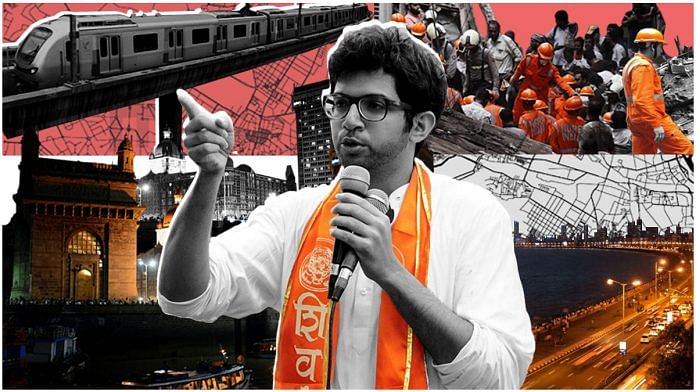Maharashtra Tourism Minister Aaditya Thackeray said the cabinet proposal allowing shops, malls and eateries in Mumbai to stay open 24×7 will boost the city’s nightlife and help it become “an international city”. The policy is optional for Mumbai’s establishments and will come into effect from 27 January on a pilot basis.
ThePrint asks: Mumbai to stay open 24×7: More cities should follow or fix creaking infrastructure first?
Cities like Kolkata and Pune will definitely embrace this policy if it turns out to be a success in Mumbai
 Shobhaa De
Shobhaa De
Columnist and novelist
If Mumbai calls itself a global and cosmopolitan destination, then this announcement is much overdue. The city has long had a certain rhythm and fast-paced lifestyle and a vibrant nightlife has been a big part of it.
I think an announcement like this would have definitely been made in conjunction with Mumbai Police. Now, the only challenge is for infrastructure to support the 24/7 functioning of these restaurants, pubs and malls, otherwise it will turn out to be a joke.
I am sure other cities will be keen to follow if it turns out to be a success in Mumbai. But that also depends on the varying cultures of certain regions and whether the youth of a particular city are keen on a 24/7 nightlife.
Kolkata and Pune are two cities that will definitely embrace this policy. It could also work in tier-II cities like Indore, Raipur and Chandigarh, which are fast-developing, have good infrastructure and comprise socially ambitious young people seeking a liberal, modern lifestyle. However, I am sceptical about whether this will work in Bengaluru because the city has had a mixed history of dealing with pub culture.
Need to address India’s toxic work culture and poor infrastructure before opting for ambitious policies like this
 Maxwell Pereira
Maxwell Pereira
Former joint commissioner of Delhi police
For a city to remain open 24×7 and for proper movement of traffic, it needs three times the infrastructure. Since women’s safety is a matter of major concern in India, protecting them and providing more security will call for more personnel as well.
Most cities in India, to an extent, have evolved themselves towards this 24×7 open concept ever since the West and more advanced countries of the world have started exploiting ‘cheap labour’ in Asia, especially in China and India.
Countries such as Bangladesh and Sri Lanka, while evolving, have paid attention to quality and international standards. Most Indian companies have failed miserably at this, and have, therefore, fallen off the tracks.
I’ve noticed that in India there is a pattern of making a fast buck at the cost of the end user. Indians would rather implement night shifts and compromise on quality of life to suit the requirements of other nations, who ironically are unwilling to suffer the consequences of the compromise.
Our central government cannot even finance the regular sanctioned strength of manpower be it in the police, fire brigade, municipal services, or any other field of activity. In fact, most employees in India steal time to do private work rather than devote time to the tasks for which they are paid a salary.
We definitely need to address toxic work culture and the poor state of our infrastructure before opting for ambitious policies like this.
Brave to implement a policy like this in India but women’s safety in public spaces should be taken into account
 Amrita Dasgupta
Amrita Dasgupta
Associate Director, women’s rights organisation ‘Swayam’, Kolkata
It is brave to implement a policy like this in an Indian city but women’s ability to access public spaces and transport safely should be taken into account.
On an individual level, women can look at apps like SafetiPin that, based on certain social indicators, tell you how safe an area is. The Maharashtra government should consult organisations like Mumbai-based Akshara Centre, which has done a lot of research on gendered spaces. Its findings show that whether it’s public toilets, buildings or public transport — India has a long way to go in creating women-friendly environments.
Having more pink taxis in a place like Nariman point, where people largely travel by cabs, would also be a good idea because they help break stereotypes of gendered roles. Azad Foundation has provided logistical support to pink cabs in Kolkata and it has been a success. Just the presence of a few pink taxis in 24/7 open areas will put a lot of women at ease if they are out late at night. But then again, taxis mostly cater to people of a certain income bracket and I wonder what safety structures could be put in place for people travelling by buses and trains.
It’s not just up to the security personnel present in the bus to stop an incident of violence. These incidents are a product of gender inequality and patriarchal structures. They need to be addressed at the family, educational and societal levels in order to make public spaces safe for women.
Most tourists come to Mumbai for business, so it’s not clear how this will help the hospitality industry
 Sulakshana Mahajan
Sulakshana Mahajan
Former urban planning consultant, Mumbai Transformation Support Unit
How do you measure the success of nightlife? That’s my first question to Aditya’s Thackeray’s announcement that malls, multiplexes and shop in Mumbai can stay open 24/7.
As an urban planner, I think the move will require strengthening of the police forces, and the Brihanmumbai Municipal Corporation (BMC). The government must also take a measure of how much this move will cost the public exchequer.
It will be better to test the policy with a before and after survey spread over six months to see if there is a robust clientele in Mumbai that supports nightlife. Only then should other cities try to experiment with it. Bengaluru might actually have more success because there is a booming IT sector with a lot of young people who have disposable income.
Also, most tourists come to Mumbai for business purposes, so I am not entirely sure how this move will prop up the state’s tourism or hospitality industry. If this hasn’t been demanded by the industry and Aditya Thackeray is only responding to the aspirations of a small section of the population, then it might be considered a political adventure.
One of the justifications for such a move is the 24-hour working schedule of many young people, in a globally connected world. However, the actual response will be necessary to evaluate its success.
Mumbai is the city that never sleeps, this move will prove it to be true
 Danish Sait
Danish Sait
Bangalore-based actor, comedian and former radio host
I grew up hearing that Bombay was the city that never sleeps, and I think the move to allow Mumbai’s restaurants and pubs to remain open 24/7 has made this come true. Although I do think it’s a double-edged sword because traffic policing and elements of infrastructure have to develop in a parallel manner.
I think it’s a progressive concept, considering Mumbai has often been seen as safer than other cities in terms of on ground conversations and mentalities, for women especially. Its massive migrant population will appreciate the ‘openness’ of this announcement. It may also spur employment in malls considering they will need double the workforce to operate throughout the day.
Then again, this will really be up to the businesses because it is not a compulsory policy. I imagine various stores and brands are already thinking of how to use this to increase demand and profits.
If something similar were to be implemented in Bangalore, I think it would be a slow roll-out since most corporates work on a 9 to 5 schedule. However, it may have appeal among employees in call centres or BPOs that work on West timings.
Also read: Mumbai building collapse: Should India save its metropolises before dreaming of smart cities?
By Pia Krishnankutty, journalist at ThePrint




Japan has long practiced such a policy, but today it is reconsidering this policy. The reason is as follows: we no longer find people to work on such working hours. Certainly the demography of Japan is not that of India. But the taste for profit, the desire to imitate what is happening elsewhere – without analyzing the indirect effects of such policies, on the lives of citizens – should not lead to taking measures that are not adapted to the economic space and Indian culture. The wisdom would be to consolidate and improve what exists before embarking on adventurous policies which could have long-term effects on employment
While this initiative covers nightlife / leisure activities, there is a need to make cities safe and supportive for commercial activities like call centres, logistics, establishments linked to the international airport, which are open through the night. Adequate public transport and special safety measures for lady employees.
The option should be there for those who need it. It will add to the burdens of the police. People who party late should be responsible, not drive and drink, women should be especially cognisant of the safety aspect. Commerce is at an ebb during normal hours, one is not sure how much will spill over after dusk.